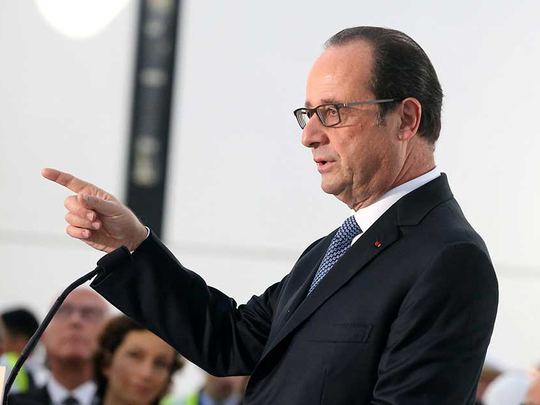
For his political farewell — announcing his unprecedented decision to not seek re-election — French President Francois Hollande could just have opted for a more lofty tone. Nothing prevented him from delivering a formal and passionate exhortation to the French, leaving his allies on the Left with a kind of spiritual testament. Whip up some energy, pass on the flame. But what did we get instead? A man’s sorry attempt to justify himself, speaking with a hollow voice and a vacant demeanour.
This was a sad epilogue to a five-year term that was insignificant at best. It was not so much Hollande’s Prime Minister, Manuel Valls, who pushed him towards the exit, as his own personal and political balance sheet, viewed as an unprecedented disaster in the nearly 60 years since the establishment of France’s Fifth Republic.
Hollande did not even try to save appearances as he bowed again to events, rather than confronting them. He leaves the public arena the way he arrived: Ill at ease, with his crooked tie and a suit he clearly could not fill.
What will France remember from his reign? Certain images perhaps, showing the singular abasement of the presidential office: The bungled expulsion of an immigrant family, a black-helmeted head of state on his scooter trying to hide a secret love affair and a book of confessions as told to two journalists, a depressing medley of cynicism and self-satisfaction that reflected his vanity before the gazing media.
There were also symbolic moments, framed in time by the solemn expressions of his last prime minister, Jean-Marc Ayrault, and the bravado of his successor Valls. Moments like his laughable turn of phrase: “Things are better now,” (“Ca va mieux”) repeated against all evidence. There was the famous “reversing of the unemployment curve” — though signs of decline are yet to be seen — and the wrath of rural workers in Brittany.
One recalls the stroppy conduct of Cabinet dissenters and ministerial disobedience, the clumsy moves to strip terrorists of their French nationality or the stress and drama of imposed labour reforms. Sure, in all fairness, Hollande could not be held responsible for the terror attacks, but at least these did, though only partially, drag him out of his negligent complacency over the threat of terrorism.
There is little left to say. France is weakened in Europe and on the world stage. Joblessness is stuck near an all-time high. The deficits and debts are cavorting unchecked. In politics, the Left is in tatters and the far-right National Front has become France’s leading party. And to think of his promises when he had said “I, president ...”
One can barely comprehend how a man they said was — and who most assuredly is — armed with a sharp and subtle intelligence, could have sunk to this depth of ridicule and forged a presidency so utterly lacking in grandeur and vision. Historians may seek a conclusion on this, though it is more a matter for psychologists.
France, instead, is turning the page, fully aware that Hollande did not renounce a second presidential term: No, quite simply, he never really was president.
— Worldcrunch 2016, in partnership with Le Figaro/New York Times News Service
Alexis Brezet is a French journalist and columnist.












